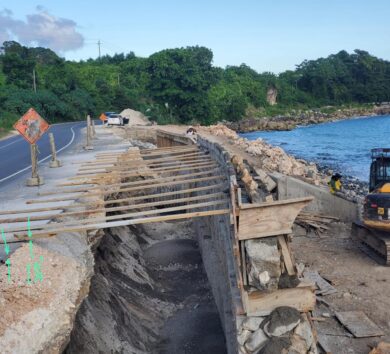

The Donald Trump administration insisted that the Caribbean island of Cuba should be subjected to an economic blockade, with no commercial and financial relations taking place with American companies or entities.
In short, Cuba was to be cut off from the greatest economy in the world with no regard for the impact this would have on its people. If it wants the blockade lifted, it will have to comply with the United States (US) Government’s wishes.
Now that the Joe Biden Administration is calling the shots, will it continue to take a hard line stance against Cuba or will it, like the Barack Obama Administration seek some kind of rapproachment?
A report by Cuba on resolution 74/7 of the United Nations General Assembly entitled, Necessity of ending the economic, commercial and financial blockade imposed by the United States of America against Cuba, issued by the Ministry of Foreign Affairs of the Republic of Cuba in October 2020 is insightful.
The report covers the period from April 2019 to March 2020, marked by a serious setback in the bilateral relations between Cuba and the US and a progressive tightening of the economic, commercial and financial blockade.
During this period, the US government, the report says, reinforced the blockade against Cuba until it reached unprecedented levels of aggressiveness.

“Contrary to the provisions of General Assembly resolution 74/7 and many previous ones, there were around 90 coercive economic actions and measures imposed by the United States Government against Cuba, with the intention of intervening in the country’s internal affairs and in clear violation of the freedom of international trade and navigation,” the report noted.
“Of this total, about half were concrete actions of the blockade, which included fines and other types of sanctions against US or third-country entities, insertion of Cuban companies in unilateral lists, extension of laws and proclamations on the blockade, announcements related to the implementation of Titles III and IV of the Helms-Burton Act and regulatory changes. Another group of measures evidenced the extraterritorial implementation of the blockade or corresponded to State Department decisions against our country,” it continued.
The way Cuba sees it, the extraterritorial dimension of this policy has been brutally intensified with the full implementation of the Helms-Burton Act since May 2019.
This legislation, it believes, is an affront to the principles of international law and international trade rules, while it provides for economic pressure actions that are harmful to the sovereignty of Cuba and third countries.
“Other measures harmful to the Cuban economy and people applied during this period are the increased persecution of Cuba’s financial and commercial transactions, the siege to deprive the country of fuel supplies, the ban on flights from the US to Cuban provinces outside Havana and the campaign to discredit Cuban medical cooperation programs.”
—Cuba’s Foreign Affairs Ministry in a report to the United Nations General Assembly in October 2020.
“Particularly alarming are the five packages of measures adopted in 2019 to monitor and impose punitive measures against companies, ships and shipping companies that transport fuel to Cuba. In this regard, illegitimate sanctions were imposed against 27 companies, 54 vessels and three individuals linked to the sector, none of them of US origin, or subject to the jurisdiction of that country. These aggressive actions by the US government are a qualitative leap in the intensification and implementation of non-conventional measures in times of peace. This is a new open and brutal violation of the rules and principles on which the system of international relations is based, including international trade rules. The United States Government has dedicated itself to threatening and blackmailing the companies that supply fuel to Cuba, and those that engage in its international transport, without having any legal or moral authority to do so,” read the report.
All these measures have a strong impact on Cuba’s economic activities, particularly those related to foreign trade operations and foreign investments.
No citizen or sector of the Cuban economy escapes the effects of the blockade, which hinders the development that any country has the right to build in a sovereign manner.

For Cubans living abroad, the blockade regulations are also daily obstacles, as they are prevented from opening bank accounts, using certain credit cards or carrying out normal transactions, just because they have Cuban nationality.
The Cuban government has made its position clear, declaring: “The blockade constitutes a massive, flagrant and systematic violation of the human rights of all Cubans. Because of its express purpose and the political, legal and administrative scaffolding on which it is based, it qualifies as an act of genocide under the 1948 Convention on the Prevention and Punishment of the Crime of Genocide.”
“This unilateral policy is the main obstacle to the implementation of Cuba’s National Economic and Social Development Plan until 2030 (PNDES, in its Spanish acronym), as well as to the achievement of the 2030 Agenda and its Sustainable Development Goals (SDG),” the report declared.
According to the report, from April 2019 to March 2020, the blockade has caused losses to Cuba of an estimated US$5.570 billion. This accounts for an increase of about US$1.226 billion over the previous period.
Cuba’s government laments the toll the blockade has had on the country’s economy and the financial damage it has wrought.
“For the first time, the total amount of damages caused by this policy in one year exceeds the barrier of five billion dollars, which illustrates the extent to which the blockade has intensified at this stage. The damage calculated does not take into account the actions of the US government in the context of the COVID-19 pandemic, because it exceeds the end of the period under review,” the Miguel Díaz-Canel administration contended.
“At current prices, the accumulated damage over almost six decades of implementation of this policy amounts to USD144,413,400,000. Taking into account the depreciation of the dollar against the value of gold on the international market, the blockade has caused quantifiable damages of over USD 1,098,008,000,000. This value represents a growth of 19 per cent over the previous period, as a result of the increase in the price of gold by 18.3 per cent,” the report added.
“Cuba notes the solidarity both Latin American and Caribbean countries have shown during this testing time with the blockade.”

The report further argued: “As part of its aggressive escalation, the US government also put strong pressure on a group of countries, particularly in Latin America and the Caribbean, with the aim of dismembering the support for the draft resolution against the blockade submitted by Cuba to the United Nations General Assembly on 6 and 7 November 2019. Despite these manoeuvres and blackmail, the voting demonstrated, once again, the overwhelming support of the international community for the Cuban cause. However, the United States has ignored, with arrogance and contempt, the 28 resolutions adopted by the UN General Assembly condemning the blockade, as well as the numerous voices inside and outside US territory that advocate the end of this policy.”
“In this context, the scourge of a global pandemic such as the COVID-19 has posed significant challenges for Cuba, and the country’s efforts to combat it have been significantly limited by the regulations of the US blockade. The genocidal nature of this policy has been reinforced in the midst of the confrontation with the new coronavirus since the US government has used it, and in particular, its extraterritorial component, to deliberately deprive the Cuban people of mechanical ventilators, masks, diagnostic kits, protective glasses, suits, gloves, reagents and other inputs necessary for the management of this disease. The availability of these resources can make the difference between life and death for patients who are carriers of the virus, as well as for the health personnel who care for them.”
“This has not been enough for the US government, which has also launched a crusade to try to discredit and hinder the international medical cooperation that Cuba offers, spreading slanders and going so far as to require other countries to refrain from requesting it, even in the midst of the health emergency created by COVID-19 in the world.”
In the current situation, in which humanity is facing an economic and social crisis accentuated by the COVID-19 pandemic, whose dimensions nobody is able to predict with certainty, it is more necessary than ever that the international community demands the lifting of the blockade imposed by the government of the United States against Cuba, which constitutes the most complex and prolonged system of unilateral coercive measures ever imposed against any country.
Full text of the abovementioned report can be found at Report by Cuba on resolution 74/7 of the United Nations General Assembly.







Comments